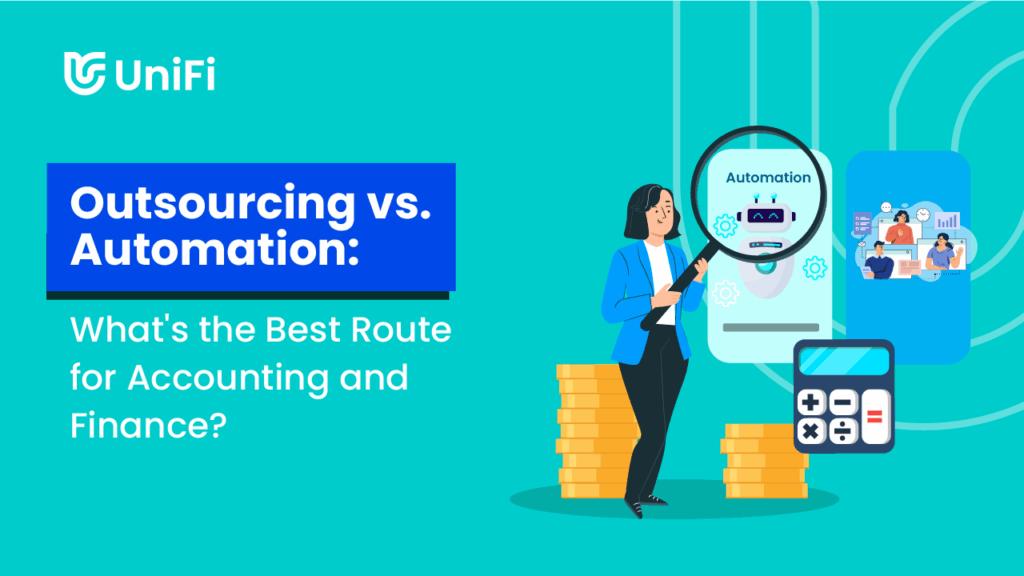As businesses grow and evolve, the need to streamline accounting and finance processes becomes increasingly important.
Organisations must decide between two key strategies to achieve this: outsourcing and automation.
While both offer ways to improve efficiency, reduce costs, and manage workloads, they take very different approaches.
So, which option is best suited for your accounting and finance operations?
Let’s compare outsourcing and automation and see why automation is rapidly becoming the preferred choice.
What Is Outsourcing?
Outsourcing involves hiring third-party providers to manage specific tasks or entire departments within your organisation.
In the context of accounting and finance, businesses often outsource functions like payroll, tax preparation, accounts payable, and financial reporting.
The main attraction of outsourcing is cost savings, as businesses can leverage the expertise of external service providers without the overhead of hiring full-time staff.
However, while outsourcing can offer short-term relief and reduce the burden of routine tasks, it comes with several limitations that may impact long-term efficiency and control.
What Is Automation?
Automation, on the other hand, involves using technology to handle repetitive, rule-based tasks within accounting and finance.
At the basic level, this can include automating processes like invoice processing, payroll management, financial reconciliations, and reporting.
At a more advanced level, modern automation platforms like UniFi leverage artificial intelligence (AI) and machine learning (ML) to help users execute and complete tasks with incredible speed and accuracy, requiring minimal human intervention.
And it gets even better with innovative capabilities like UniFi’s first-of-its-kind Accounting Automation feature.
Unlike other solutions that merely automate approvals and still require manual posting to your accounting system, this feature takes it a step further by automating accounting postings. With it, you can automate the entire process, from approvals to accounting entries, ensuring seamless and efficient operations.
Automation is particularly appealing because, unlike outsourcing, it brings greater control over processes while ensuring scalability, accuracy, and cost efficiency over time.
Automation Processes in UniFi
There are two types of process automation available in UniFi: an Automation Process and an Autonomous Process.
An Automation Process assists Full, Credit, or Bot users by enhancing efficiency through features like a Calculation Engine, Process/Workflow Engine, and Accounting Automation Engine.
On the other hand, an Autonomous Process is fully managed by Bots that can perform tasks like a human, further reducing manual intervention and freeing users for strategic work.
Outsourcing: The Pros and Cons
Pros:
- Immediate Expertise: Outsourcing allows businesses to tap into specialised expertise, especially for complex tasks such as tax compliance or financial audits.
- Cost Reduction: By outsourcing, companies can reduce the overhead costs associated with hiring, training, and managing full-time staff, especially in regions where wages are high.
- Flexibility: Outsourcing provides flexibility, allowing businesses to scale up or down without needing to hire or lay off employees.
Cons:
- Loss of Control: When outsourcing finance tasks, you relinquish some control over critical processes. This lack of oversight can lead to delays, errors, or inconsistent quality in service delivery.
- Confidentiality Risks: Accounting and finance involve sensitive data, and outsourcing can increase the risk of data breaches or unauthorised access to financial information.
- Ongoing Costs: While outsourcing can reduce short-term costs, long-term contracts with external providers can become expensive, especially if service quality fluctuates.
Automation: The Pros and Cons
Pros:
- Cost Efficiency: Automation may have higher upfront costs, but it offers significant long-term savings by reducing manual labour and eliminating costly human errors.
- Improved Accuracy: Automated systems perform tasks with high precision, reducing the risk of mistakes in areas like payroll, invoicing, and reconciliations.
- Scalability: Automation can handle increased workloads without the need to hire or train additional staff, making it ideal for businesses that are growing or experiencing seasonal fluctuations.
- Continuous Operation: Unlike outsourcing providers, automation works around the clock. A great example is UniFi Bot Users. Automated systems do not take breaks, ensuring faster processing times and continuous availability.
Cons:
- Initial Investment: Automation tools often require upfront investment in technology and system integration, which may be a barrier for smaller businesses. However, with a platform like UniFi, you can get enterprise-grade software without the cost.
- Learning Curve: Teams may need time to adapt to new systems and processes, and training may be required to fully maximise the benefits of automation.
Why Automation is Winning Over Outsourcing
While outsourcing has long been a popular strategy for managing accounting and finance tasks, automation is quickly becoming the more sustainable solution.
Here’s why:
Greater Control
With automation, businesses can retain full control over their financial processes.
This means no reliance on external providers or concerns about the quality and timeliness of outsourced services.
Scalability Without Additional Costs
As companies grow, automation allows finance teams to handle more work without needing to increase headcount.
This flexibility ensures businesses can scale efficiently without incurring additional outsourcing fees.
Accuracy and Speed
Automation tools deliver far greater accuracy and speed than human-managed outsourcing solutions.
This is especially crucial in financial processes, where errors can lead to costly consequences.
The Future of Accounting and Finance
In an increasingly competitive business environment, companies need to stay ahead by embracing technologies that enhance efficiency and reduce costs. While outsourcing can provide short-term support, automation offers a long-term, scalable solution that keeps businesses in control of their financial operations.
Automation is not just about replacing manual processes—it’s about empowering finance teams to focus on higher-value activities like strategy, analysis, and decision-making.
By leveraging automation, organisations can achieve greater efficiency, accuracy, and scalability in their accounting and finance departments, making it the clear choice for forward-thinking businesses.
Ready to explore automation for your business? Book a free UniFi demo.


